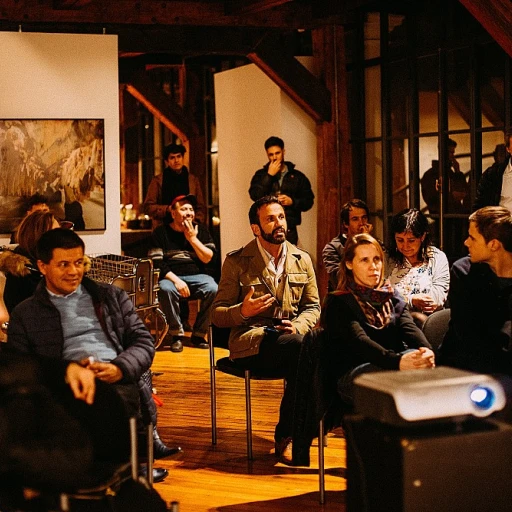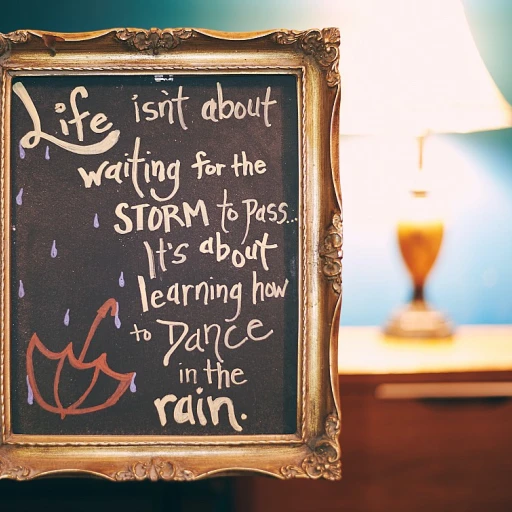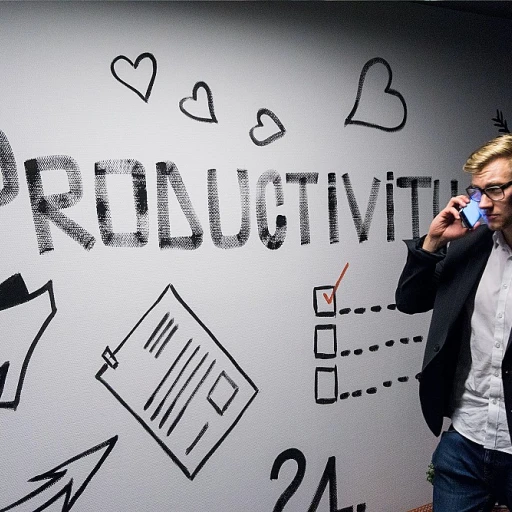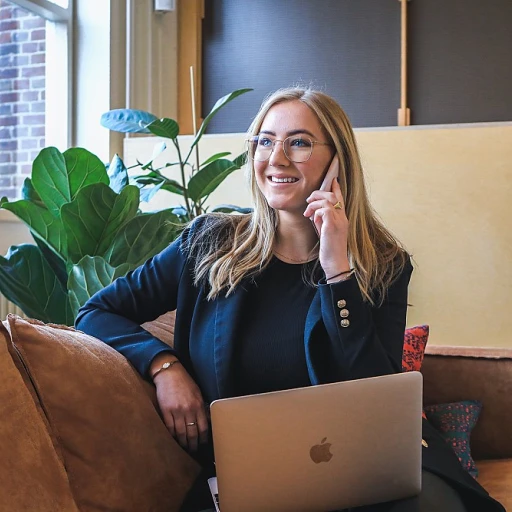
Understanding the Role of Creativity in Mentoring
Embracing Creativity in Mentoring
In the realm of professional mentoring, creativity is not just an added bonus; it is a crucial component that can lead to innovative solutions. Creativity in mentoring involves the ability to think outside the box, offering unique perspectives and approaches to problem-solving. This is particularly important when mentors and mentees face challenges that require more than conventional answers.
One might wonder, when does creativity come into play in mentoring? The answer lies in the dynamic nature of mentoring relationships. Whether it's during a project management discussion or a career development session, creativity can help in finding solutions that are not immediately obvious. For instance, a mentor might describe a time when they used creative thinking to overcome limited resources, thereby setting an example for their mentee.
Creative Problem-Solving in Action
Creative problem-solving is a skill that can be developed and honed over time. It involves a series of steps, including identifying the problem, brainstorming potential solutions, and evaluating these solutions to find the most effective one. This process is not only about finding a solution but also about enhancing the mentee's decision-making and problem-solving skills.
Consider a situation where a mentee is preparing for an interview. The mentor can use creative techniques to help the mentee anticipate interview questions and formulate example answers that showcase their candidate ability. This approach not only prepares the mentee for the interview but also boosts their confidence and problem-solving skills.
For those interested in exploring more about effective strategies in mentoring, you might find this resource on effective strategies for mentoring interns insightful.
Real-Life Examples of Creative Problem-Solving
The Power of Creativity in Real-Life Mentoring Scenarios
Exploring the role of creativity within mentoring, it's essential to examine real-life scenarios where mentors and mentees have navigated challenges through innovative thinking. It's fascinating to observe how creative problem-solving serves as a catalyst in professional development. Here, we delve into various examples illustrating the transformative nature of innovative solutions.
One notable example of creativity within professional mentoring involves a project management situation where limited resources seemed to constrain potential outcomes. When a mentee faced restrictions in budget and manpower, the mentor's creative approach encouraged a reassessment of solutions, leading to the team's ingenious reprioritization of tasks. This crucial moment fostered innovative solutions, showcasing how tapping into creative problem-solving skills can redefine project objectives successfully.
Through the lens of an interview process, creative problem-solving takes on a different form. Mentees grappling with anticipatory anxiety often benefit from tailored mock interviews that simulate a real-time decision-making environment. By prompting them to describe a time when they overcame a tricky problem, these practical sessions enhance their ability to articulate examples where their creative thinking was pivotal. For instance, interview questions crafted to focus on behavioral situations assist candidates in honing their problem-solving skills, leading to achievements that hold significant sway over job prospects.
In another scenario, when a professional team encountered a communication breakdown, a mentor introduced creative exercises to boost team dynamics. This practice not only improved communication skills but also inspired inventive methods for future collaboration, paving the way for an effective workplace atmosphere. Such initiatives demonstrate how cultivating a creative problem-solving mindset can lead to meaningful progress and solutions that extend beyond traditional methodologies.
By fostering these scenarios and exploring the breadth of creative skills acquisition, mentors and mentees alike can refine their approaches to problem resolution, ensuring more confident and effective professional journeys.
Techniques to Foster Creativity in Mentoring Relationships
Techniques to Cultivate Innovation and Creativity
In the realm of professional mentoring, fostering creativity involves more than just encouraging out-of-the-box thinking. It requires a deliberate approach to nurturing an environment where creativity can thrive. Here’s how mentors can integrate creative techniques into their mentoring strategies to enhance problem-solving skills and inspire innovative solutions.
- Embrace Diverse Perspectives: Encourage mentees to seek input from various team members. By broadening their horizons and welcoming different viewpoints, mentees can enhance their creative thinking abilities and devise innovative solutions to complex problems.
- Adopt Structured Problem-Solving Techniques: Utilize frameworks such as the "SCAMPER" technique (Substitute, Combine, Adapt, Modify, Put to another use, Eliminate, Reverse) to systematically approach problems. Mentors can guide mentees to experiment with these techniques, helping them find creative solutions when faced with limited resources.
- Simulate Real-World Scenarios: Utilize scenario-based problem-solving exercises during mentoring sessions. By creating hypothetical situations or drawing on real-life examples faced during projects, mentors can prepare mentees for interviews by honing their decision-making skills. Such exercises are instrumental when interview questions explore a candidate's ability to describe times they solved challenging problems.
- Encourage Reflective Practices: Ask mentees to recount occasions when they successfully utilized creative approaches in previous projects. By reflecting on past achievements, mentees can identify patterns that promoted creative successes and replicate these strategies.
- Provide Opportunities for Experimentation: Allow mentees to take on side projects that don't have immediate constraints or risks. This provides them the freedom to experiment with inventive techniques or technologies, which can translate into innovative solutions in more significant project management contexts.
Each of these methodologies aids in molding mentees into adaptable and resourceful problem solvers. They’re pivotal when preparing candidates for their next roles and can be a part of mastering the art of executive interview coaching, equipping them with the creativity and problem-solving skills essential for career advancement.
The Impact of Creative Solutions on Career Development
Enhancing Career Development with Creative Solutions
In the fast-paced world of professional mentoring, creativity is not simply a nice-to-have skill; it is an essential component that can lead to innovative solutions and significantly impact career development. The ability to leverage creative thinking in problem-solving plays a crucial role in transforming career trajectories. One of the primary advantages of fostering creativity in mentoring is the ability for individuals to tackle complex challenges with creative problem-solving skills. When mentees are encouraged to think creatively, they learn to develop unique approaches to answer questions that do not have straightforward solutions. This ability becomes particularly valuable in the job market where candidates often face tough interview questions designed to gauge their innovative problem-solving abilities. For example, a common situation where creativity is pivotal is during a project when resources are limited. By adopting a creative mindset, mentees can find solutions that may not be immediately obvious and demonstrate their candidate ability in stressful situations. This can be especially relevant when examples of time management and decision-making are discussed in mentoring sessions. These discussions often highlight a candidate's ability to describe situations where they successfully navigated challenges, showcasing their creative thinking. Additionally, creativity in mentoring aids in honing skills that are not only applicable in the workplace but also in personal development. Creative solutions can redefine how mentees perceive and tackle problems, boosting their confidence and enhancing their professional growth. Moreover, mentees who develop strong creative problem-solving skills often excel in project management roles, becoming valuable assets to their teams. Ultimately, the impact of creative solutions extends beyond individual career development and contributes to broader organizational success. Teams that embrace a culture of creativity are more likely to develop innovative solutions, thus gaining a competitive edge in their respective industries. As mentoring relationships continue to evolve, integrating creativity into the foundation of professional development will undoubtedly continue to yield long-term benefits for individuals and organizations alike.Challenges in Encouraging Creativity and How to Overcome Them
Navigating the Hurdles of Promoting Innovation
In the dynamic world of professional mentoring, one would expect creativity and innovative solutions to flow naturally. However, there are significant challenges in encouraging a creative approach, particularly within professional settings where traditional methods are often the norm. Understanding these hurdles and knowing how to navigate them can make a significant difference in the outcome of mentoring relationships. Firstly, there's the issue of time constraints. Mentors and mentees often juggle numerous responsibilities, which can limit the time available for creative thinking. When pressed for time, it's common for individuals to revert to familiar problem-solving techniques rather than exploring more innovative solutions. Another challenge is the potential resistance to change. Many professionals prefer sticking to tried-and-true methods, which can stifle creativity. When mentors encourage candidates to think outside the box, there's sometimes pushback from mentees unaccustomed to deviating from traditional paths. To counter these challenges, mentors can actively work on creating an environment that fosters innovative thought. Here are some strategies:- Encourage Open Dialogue: Create an atmosphere where questions and answers flow naturally. By encouraging open communication, mentors can help mentees become more comfortable with proposing creative solutions.
- Use Real-Life Scenarios: Describe situations where creative problem-solving was instrumental in project success. These can serve as powerful examples and inspire mentees.
- Interview Techniques: Ask interview questions that focus on creative thinking. For instance, "Describe a time when you were faced with limited resources and how you found a solution." Such questions can help candidates demonstrate their ability to think creatively under pressure.
- Emphasize the Value of Innovative Solutions: Reinforce the notion that in today’s fast-paced work environment, the ability to generate innovative solutions is a highly sought-after skill. Highlight successful projects that benefited from such approaches.
Future Trends: Creativity in the Evolving Landscape of Mentoring
Embracing Creativity in the Future of Mentoring
As the professional landscape continues to evolve, creativity in mentoring is becoming increasingly vital. The ability to think outside the box and develop innovative solutions is no longer just a nice-to-have skill; it's essential for staying competitive. In this context, the role of creativity in mentoring is expanding, offering new opportunities for both mentors and mentees.
One of the key trends is the integration of technology to enhance creative problem-solving skills. Digital tools and platforms are being used to simulate real-life scenarios, allowing mentees to practice their decision-making abilities in a safe environment. This approach not only helps in honing creative thinking but also prepares candidates for real-world challenges.
Moreover, the shift towards remote work has highlighted the importance of creative solutions in team collaboration. Mentors are now tasked with guiding their mentees on how to effectively communicate and collaborate with limited resources. This includes teaching them how to leverage digital communication tools and project management software to maintain productivity and foster innovation.
Another emerging trend is the focus on personalized mentoring programs that cater to individual needs and strengths. By tailoring the mentoring experience, mentors can better nurture the creative abilities of their mentees, helping them to find solutions that are both innovative and practical. This personalized approach also encourages mentees to take ownership of their learning journey, enhancing their problem-solving skills over time.
Finally, as organizations place greater emphasis on diversity and inclusion, there is a growing recognition of the value that diverse perspectives bring to creative problem-solving. Mentors are encouraged to foster an inclusive environment where different viewpoints are welcomed and valued. This not only enriches the mentoring experience but also leads to more comprehensive and innovative solutions.
In conclusion, the future of mentoring is bright, with creativity at its core. By embracing these trends, mentors can equip their mentees with the skills needed to navigate the complexities of the modern workplace, ensuring they are well-prepared to tackle any challenge that comes their way.













